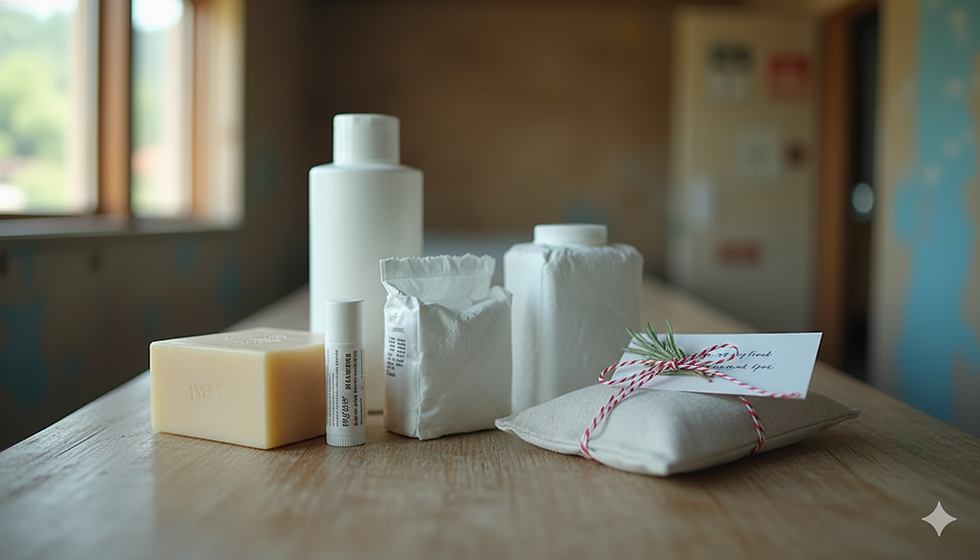How the COVID Shutdown Paved the Way for Women to Explore Alternative Menstrual Products
- alorenzo040
- Oct 7, 2025
- 3 min read
The COVID-19 pandemic dramatically reshaped our daily lives, influencing everything from our work habits to shopping methods. For me, one unexpected - but positive change was my approach menstrual products. As lockdowns took hold, I discovered that I now had the time to explore alternatives to traditional products that I might have never have tried before.
This blog post examines how this unique environment allowed countless women to experiment with these options, leading to greater acceptance and understanding of menstrual health.
The Shift in Shopping Habits
With physical stores closing and the majority of shopping moving online, women began re-evaluating their menstrual product options. While traditional pads and tampons remained available, endless online choices became appealing.
During this period, many women turned to menstrual cups, reusable cloth pads, and period underwear. For instance, a survey by the company Responsible Products showed that purchases of menstrual cups increased by 25% in 2020. The at-home environment made these alternatives less intimidating, as women felt empowered to try something new away from public scrutiny.
The Rise of Menstrual Cups
Menstrual cups experienced a significant surge in popularity during the pandemic. Made from silicone or rubber, these cups are designed to collect menstrual fluid and can last for several years, making them environmentally friendly and cost-effective.
Many women who previously hesitated to try menstrual cups due to fears about insertion or leaks found themselves more willing to experiment. The added privacy of being at home allowed them to practice using the cups without the anxiety of a public restroom. Reports indicate that sales for menstrual cups rose by 40% in mid-2020 compared to the previous year.
Embracing Reusable Cloth Pads
Another alternative that solidified its place during the COVID shutdown was reusable cloth pads. Constructed from soft, absorbent fabrics, these pads can be washed and reused, making them an excellent sustainable choice.
Women began to recognize the comfort and customization that cloth pads can offer. With time available to research online, many discovered brands providing various styles, colors, and absorbency levels. Some companies would report as much as a 60% increase in sales of cloth pads, allowing women to take a more personal approach to their menstrual health.
The Popularity of Period Underwear
Period underwear witnessed rising interest throughout the pandemic. Designed to absorb menstrual flow, these innovative undergarments provide a leak-proof solution that appealed to many women.
At home, women felt more inclined to try period underwear either as a primary product or as a backup to other menstrual solutions. The ease of simply wearing them—without needing additional products—made them especially attractive. According to a report, period underwear sales increased by 35% in 2020, showcasing a growing preference for comfortable and convenient menstrual products.
The Importance of Education and Community
The COVID shutdown fostered a sense of community among women exploring alternative menstrual products. Online forums, social media groups, and blogs became vibrant platforms for sharing experiences and recommendations.
Through this increased engagement, women began to educate themselves about menstrual health in ways that had not been as common before. According to data from the Menstrual Health Hub, there was a 50% increase in online searches related to menstrual health topics from March to July 2020. This heightened understanding helped to demystify alternative products and encouraged women to make informed choices regarding their menstrual health.
Sustainability and Environmental Awareness
The pandemic also led to a greater focus on sustainability and environmental concerns. As awareness around consumption habits grew, many women started considering the environmental impact of their menstrual products.
Switching to alternatives like menstrual cups, cloth pads, and period underwear can significantly reduce waste. A typical menstruator uses over 11,000 disposable pads and tampons in their lifetime, contributing to millions of tons of waste. The COVID shutdown prompted a wave of critical thinking about choices and how they can positively impact the planet.
Women’s Evolving Approach to Menstrual Health
The COVID-19 pandemic has undoubtedly transformed how women approach menstrual health. With the shutdown creating a space for exploration, many women embraced alternative menstrual products they might not have considered before.
From menstrual cups to reusable cloth pads and period underwear, the shift in shopping habits and increased access to information empowered women to make informed choices about their bodies and the environment. As we continue to navigate this new reality, it will be exciting to see how menstrual product preferences evolve and influence the ongoing conversation around menstrual health.







Comments